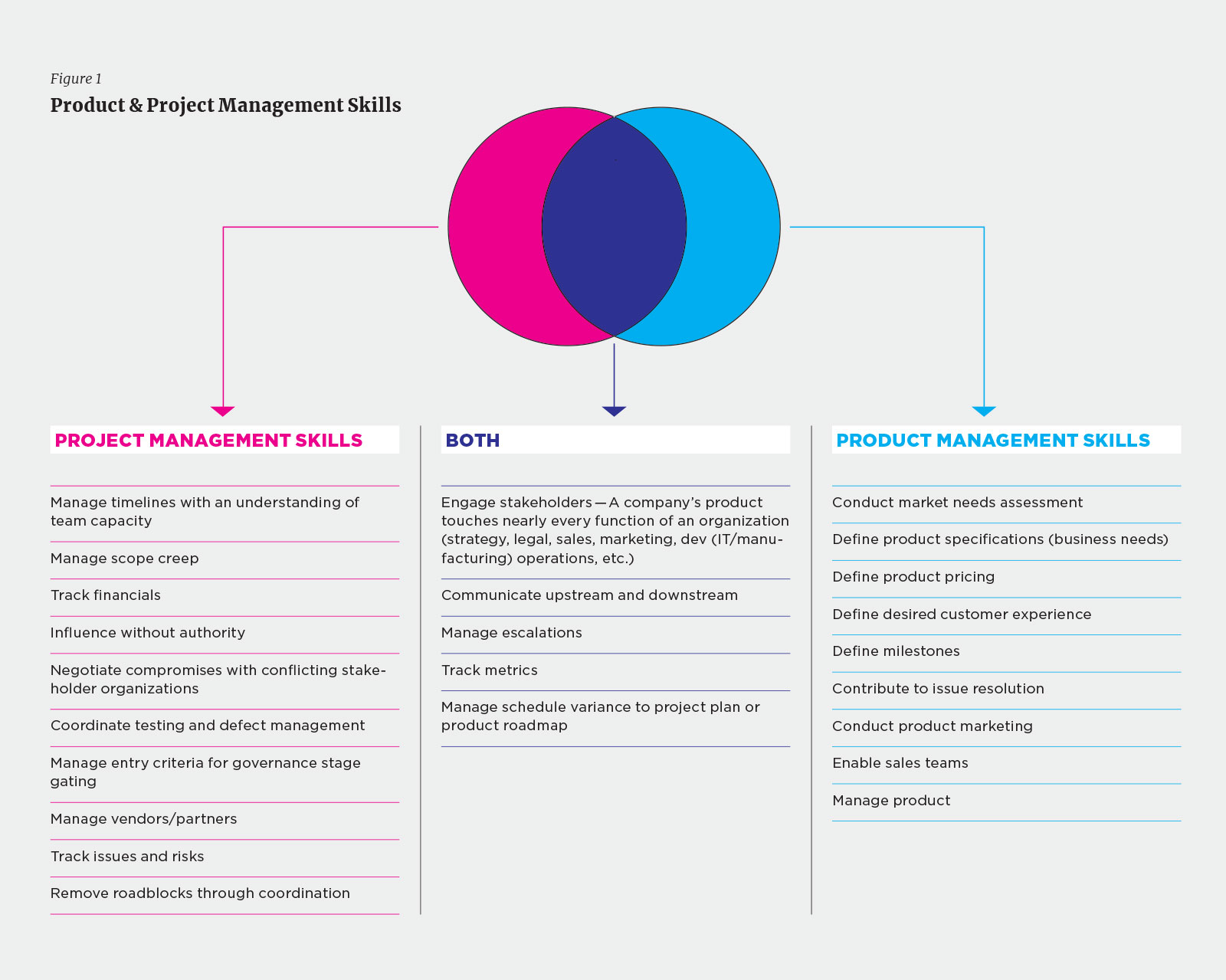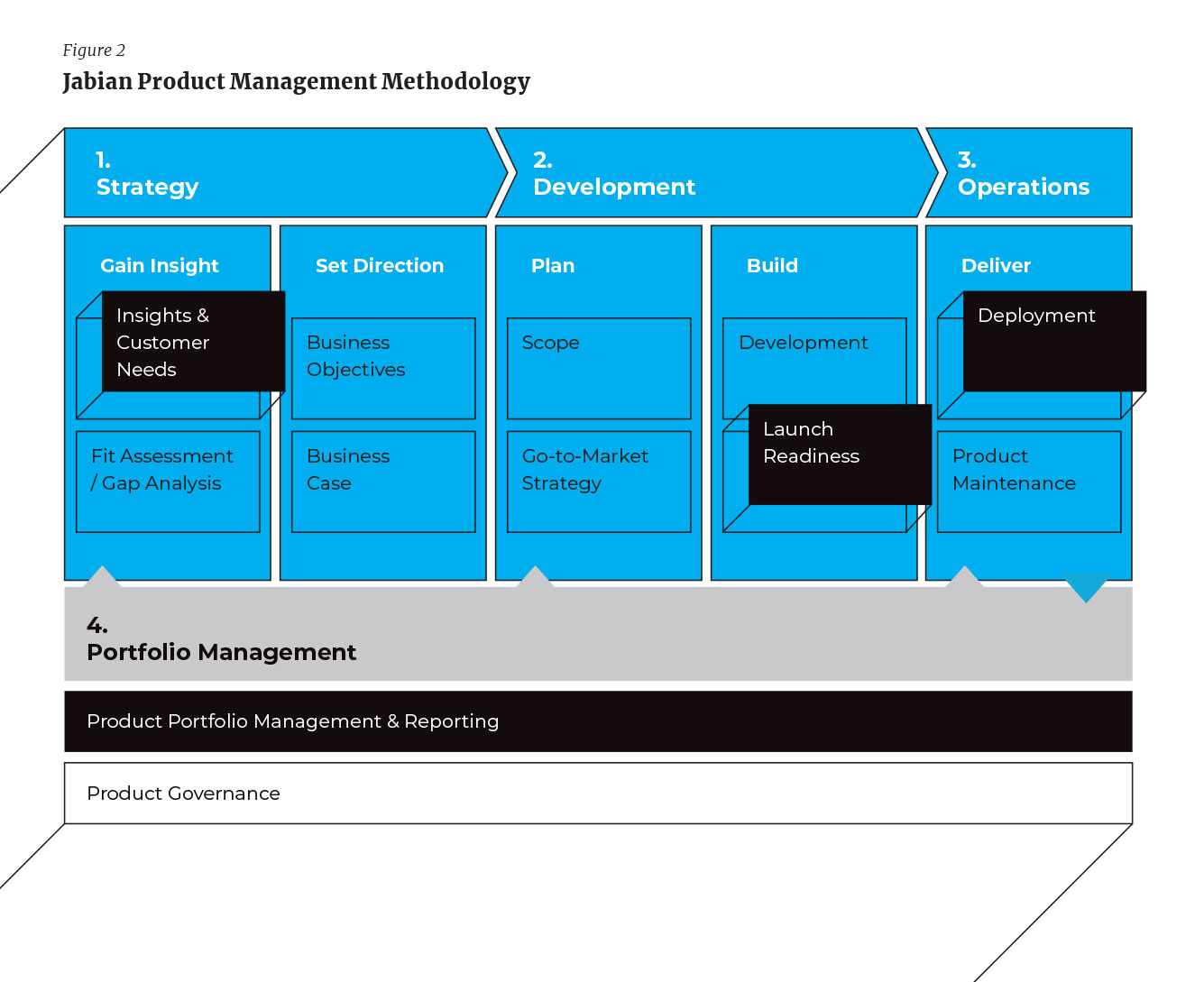There are similarities and differences in the skill sets of project managers and product managers. But be careful not to combine the two roles.
In our experience, we have seen that sometimes organizations want and then expect product managers to carry out project management responsibilities in addition to their product responsibilities. While it’s helpful for team members to have working knowledge of project management skills (such as coordination of tasks to keep work progress moving), a dedicated project manager who drives discipline at critical points of a product development life cycle yields the best results.
In this article, we’ll share specific examples of when it’s critical to engage project managers along the product management life cycle. We will also share examples from seasoned leaders about challenges they’ve faced when the project management function has been assigned to someone without formal training or project management experience. And lastly, we’ll give our recommendations on how to integrate the two functions of product management and project management.
First, let’s clarify how we define product versus project management, as well as the differences and similarities between them.
The Product Management function is responsible for the product’s overall success from:
1. strategic planning to,
2. technical development to,
3. market release.
Product management defines and has oversight for the entire product life cycle, including the roadmap for its evolution. They focus on overall product strategy and success — often being thought of as the CEO of a product.
Products are defined as service-based offerings, physical and/or digital goods, and/or experiences delivered to customers or end users.
Project Management is the art of coordinating resources and directing unidisciplinary groups so that the components of work performed by each group accumulate into a multidisciplinary team effort that achieves the desired objectives on time and within budget. (Source: Project Management Institute). Project Managers focus on coordination and orchestration, with success defined by minimal schedule and cost variance.
Projects are time-bound and made up of activities (sequential and/or parallel) that, when all is said and done, result in value delivered.
When staffing and building your Product organization, consider the following important differences in skills as well as where the roles overlap (Figure 1).

SPEAKING WITH EXPERTS
We sat down with two seasoned executives to learn their perspectives on the intersection between the Project Management and Product Management disciplines. Cyronne Counts offered her perspectives from a product management perspective, and Stephanie Stackpole offered her perspectives from a project management lens. While we had our point of view, we wanted to learn their perspectives on this intersection of product management and project management.
What we found most interesting is that they shared a perspective that the relationship between project and product managers should be a tight partnership in which they work alongside each other. Counts added, “For interactions to work well, the relationship between project managers and product managers should never be a reporting relationship.”
They shared our perspective that the roles of project managers and product managers are equally important yet have different focus areas. Where product managers are focused on setting the strategic vision for a product, project managers are focused on organizing and resourcing the work to make progress toward achieving that vision. “Stackpole shared, product managers and project managers in partnership is the best way to move forward to create and launch products. When you have a project manager who is strong and can anticipate risks and ask questions about things that product managers may not be doing. Product managers have the capacity to be creative and innovative.”
To break it down, we’re anchoring to the Jabian Product Management Methodology (Figure 2) to illustrate areas where we believe dedicated project management is valuable. We’ve highlighted just a few areas, we’ll explore later.

RISKS OF NOT INTEGRATING THE FUNCTIONS
Let’s explore what happens when dedicated project managers are not engaged in critical parts of your product management life cycle.
Organizations sometimes self-medicate by asking product managers to take on project management responsibilities. And while the solution may feel like a resource optimization or efficiency gain by not adding headcount, shifting project management responsibilities onto your product manager poses a couple of challenges. Your product manager’s focus shifts away from delivering against the product vision. Also, without a deep knowledge of the project management discipline (learned formally and/or from experience), there may be major project management misses.
Some other trade-offs or compromises can include:
- Burnout from taking on additional project management responsibilities, while keeping up with product management responsibilities.
- Delays in delivery and time slippage.
- Unfavorable customer interactions with products and solutions if not enough focus is dedicated to the experience design.
- Misaligned leadership expectations.
If you are considering asking your product teams to take on project management responsibilities consider these compromises, because product management efforts could go off track, and that perceived short-term Band-Aid creates more work in the long run.
For products to be successful, the product manager must stay focused on ensuring the product achieves the strategic product vision outlined in the business case, instead of getting stuck in the weeds of project management. Cyronne shared, “The biggest impact is that the product manager must take their eyes off the job of the product manager. The product manager spends time worrying about timelines and budgets and coordinating activities of manufacturing when they shouldn’t be so concerned with the manufacturing timelines, for example.”
CASES WHERE PROJECT MANAGERS SHOULD BE INVOLVED
We asked our experts for their thoughts on the right time to bring in project managers on product management initiatives. We shared the perspective with the experts we interviewed that it’s best to get the project manager engaged — and sometimes as early as possible.
We’ve outlined a few examples of when dedicated project managers should be brought in to help product teams:
Market and Competitive Analysis: Within the Insights & Customer Needs portion of the Jabian Product Management Methodology, we recommend product strategy managers keep their pulse on market needs. They should then take a hypothesis-driven approach to research and then validate assumptions. Product managers focus on all insight mining to uncover the best path forward.
While the product manager owns building the business case for new products or product changes, they can help mobilize teams to drive forward. The project manager can coordinate teams to bring about the right information quickly and drive to hit target dates. The project manager can help hold the product team accountable for making decisions and potentially identify risks
early on.
Prioritization: Having a good portfolio management process in place helps in many ways, but we’ve found it especially helpful with keeping executives and decision-makers engaged and focused. Product teams are pulled in different directions by market insights, sales teams, and technology advances. Project management can keep a pulse on whether products achieved expected outcomes in the business case and know how many of the strategic objectives get accomplished in a set time with effective lead product portfolio management in place. Project managers can undertake stakeholder engagement to ensure executives are aware of and on board with changes in direction if needed.
Product Launch Readiness and Product Launch: A new product launch requires a great deal of coordination across nearly every cross-functional team in a company — from product management to technology, marketing, communications, sales, pricing, promotions, account management, client installation teams, customer service, and support. A dedicated project manager can help with stakeholder management and call out cross-functional dependencies, identify and escalate issues or risks early, and set mitigation plans to ensure a smooth launch.
CLOSING
The product management function ranges widely from initial product conceptualization through marketing and sales to managing the day-to-day product operations post-go-live and managing performance metrics, whereas the project management function is exercised at specific points to aid in accomplishing a specific end goal.
When done right, organizations closely align these functions that maximize the potential for success. We have found that when experienced project managers are dedicated to product management teams at critical points in the product life cycle, they offer additional strength and value. Project managers offer added leadership from the lenses of anticipating potential issues, risks, or blockers and driving accountability to help product teams meet their strategic objectives.
For the best outcome for your product organization, our recommendation is to invest in dedicated project managers assigned to mission-critical items. We recognize there are several barriers that exist to prevent this from happening. We understand what it takes to get financial approval for an additional headcount. We have seen and experienced the very real war for talent that the Great Resignation has presented. You may be tempted to upskill your product teams to take on project management responsibilities, but consider the trade-offs. As product leaders, are you willing to take your focus off the product vision?
Years ago, I wrote another Jabian Journal article (Enhancing Effectiveness in Your Product Organization) in which I analogized product teams to an orchestra: “Just as an orchestra is comprised of musicians skilled in playing various instruments, a product group should be comprised of various individuals, in different roles, possessing different product skill sets.” To expand on this concept, think about the project manager in this analogy as the orchestra’s stage manager. The stage manager schedules rehearsals, communicates key messages, and coordinates work for the stage crew to complete. Simply put, the orchestra performance cannot go on without the stage manager. Looking beyond the orchestra of your core product team, we encourage you to do what it takes to get your stage manager and your dedicated project management embedded in your product organizations.
Special Thank You:
We’d like to thank Stephanie Stackpole and Cyronne Counts for sharing their input on Project Management and Product Management, respectively. Stephanie Stackpole serves as the Vice President of Strategic Programs and Implementation with Vericast. Cyronne Counts is the Director of Programs at Women in Product. The opinions of individuals quoted in the article don’t necessarily reflect the opinions of their employers.
